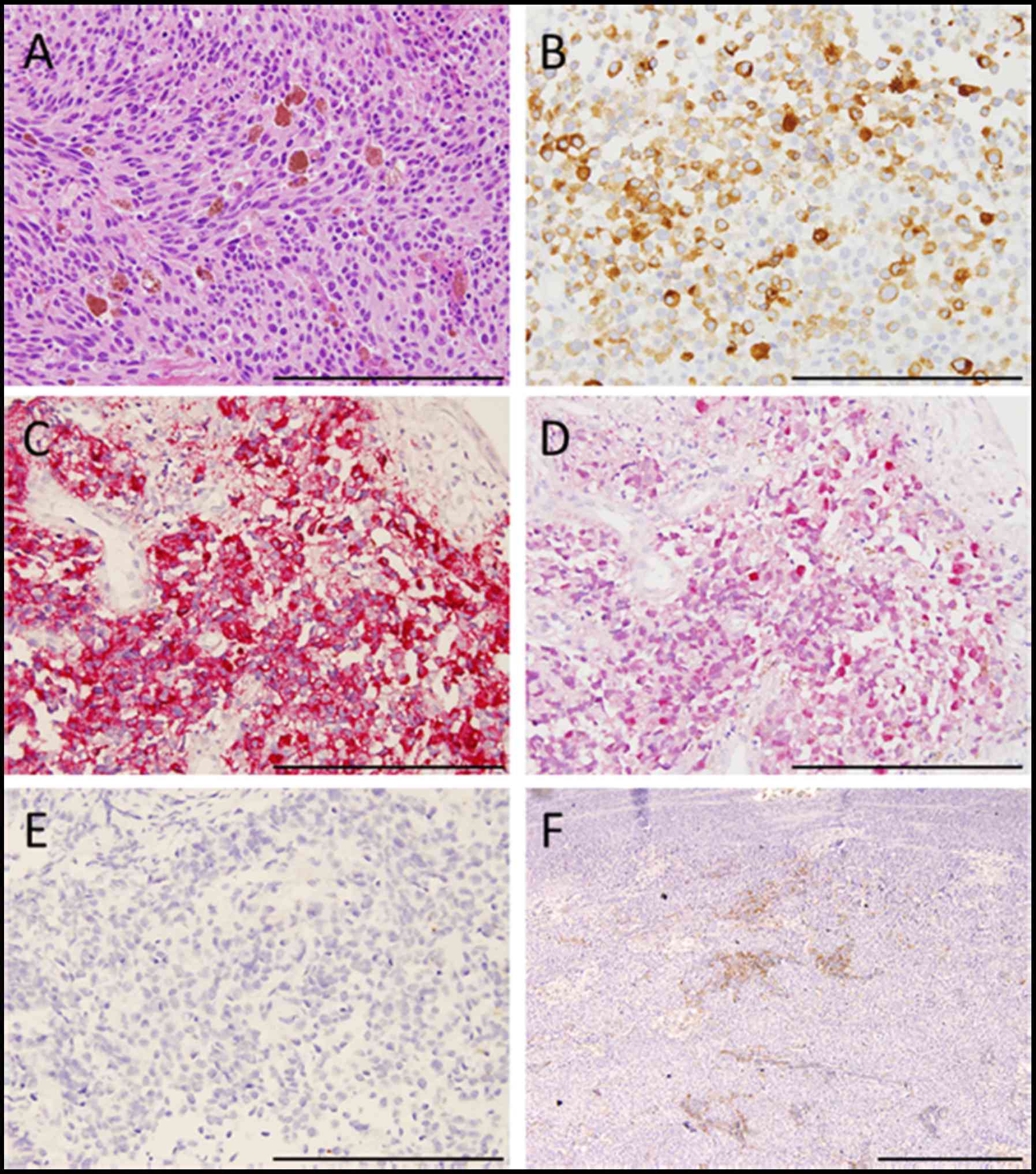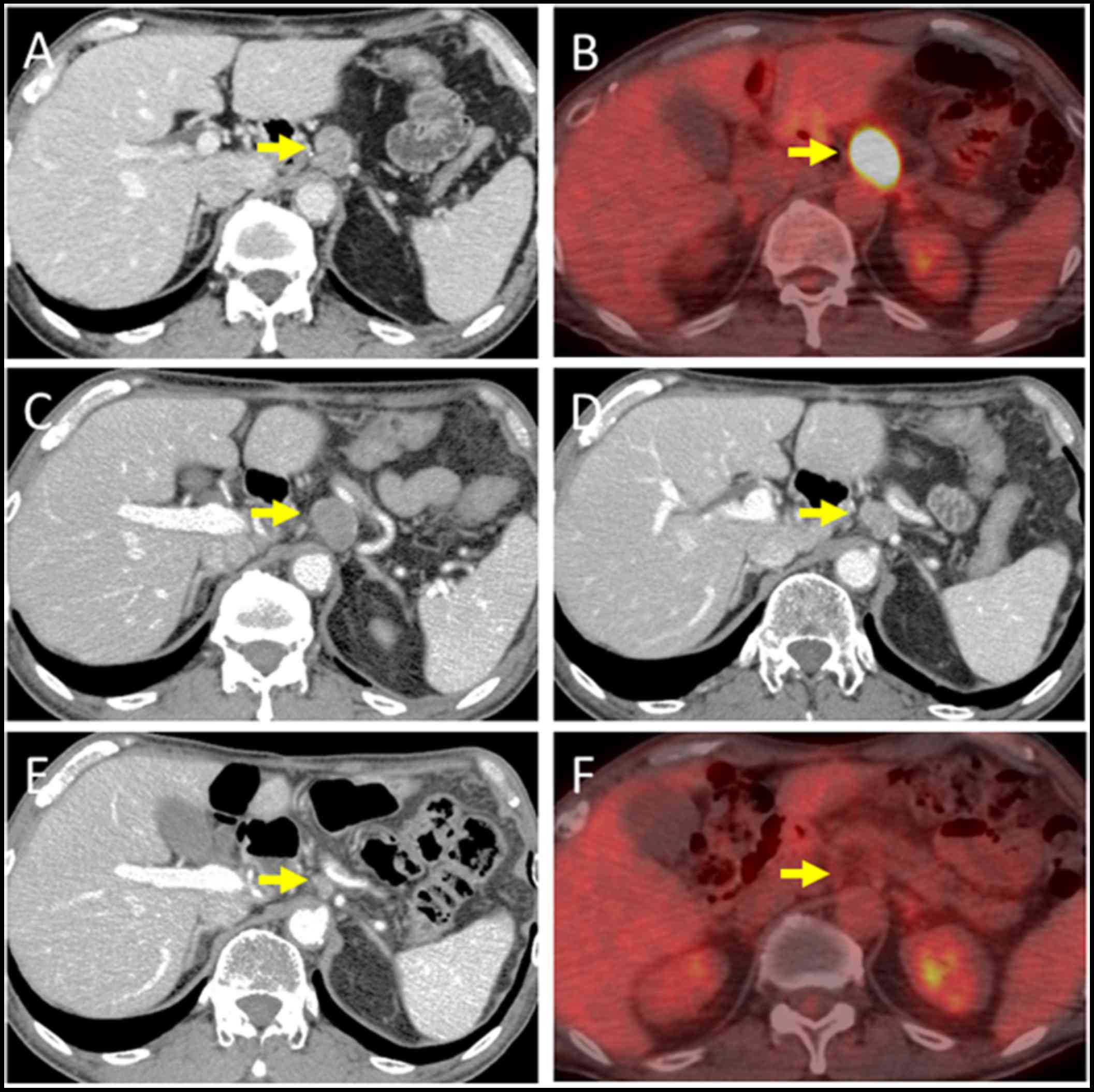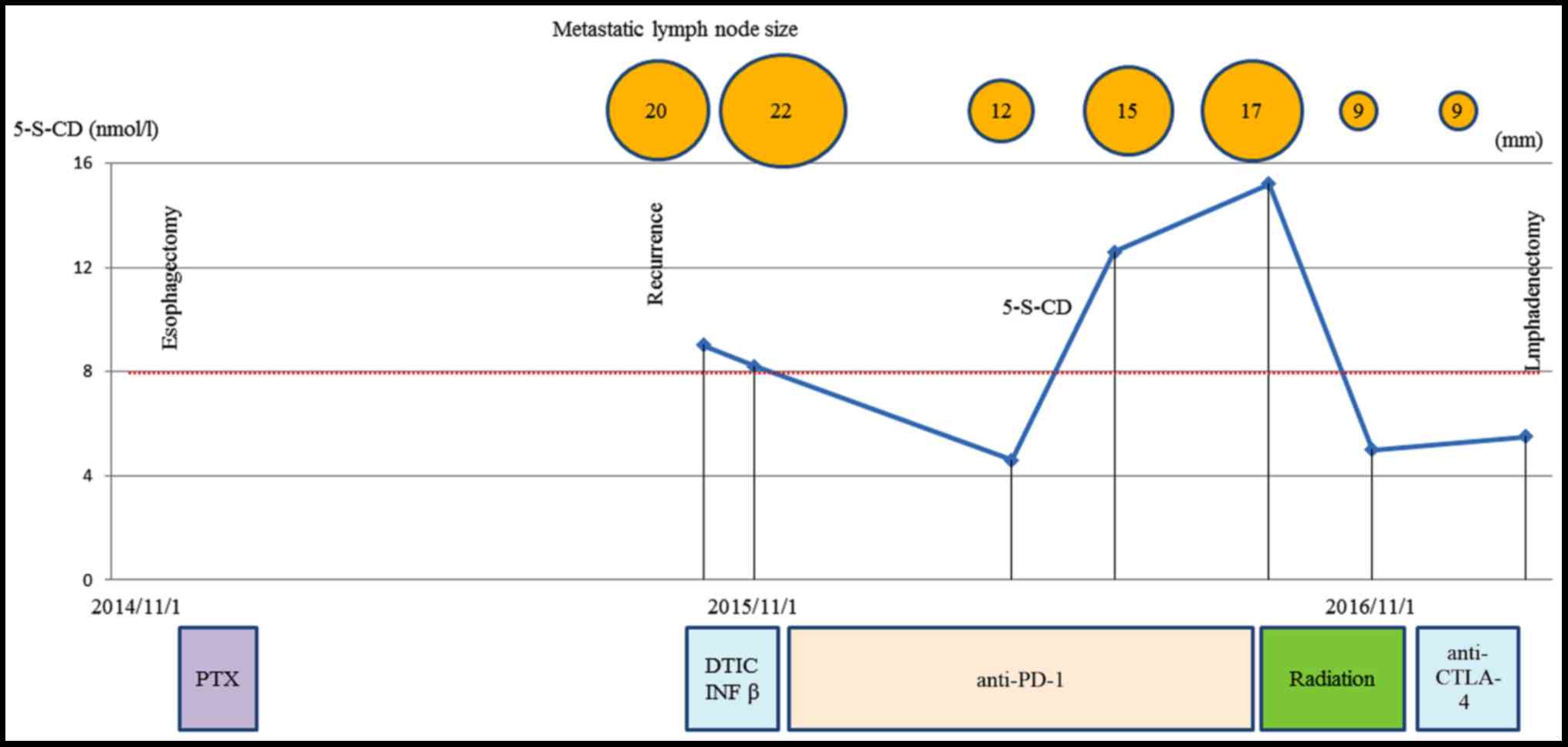|
1
|
Makuuchi H, Takubo K, Yanagisawa A and
Yamamoto S: Esophageal malignant melanoma: Analysis of 134 cases
collected by the Japan Esophageal Society. Esophagus. 12:158–169.
2015. View Article : Google Scholar
|
|
2
|
Terada T: A clinicopathologic study of
esophageal 860 benign and malignant lesions in 910 cases of
consecutive esophageal biopsies. Int J Clin Exp Pathol. 6:191–198.
2013.PubMed/NCBI
|
|
3
|
Sabanathan S, Eng J and Pradhan GN:
Primary malignant melanoma of the esophagus. Am J Gastroenterol.
84:1475–1481. 1989.PubMed/NCBI
|
|
4
|
Weber JS, D'Angelo SP, Minor D, Hodi FS,
Gutzmer R, Neyns B, Hoeller C, Khushalani NI, Miller WH Jr, Lao CD,
et al: Nivolumab versus chemotherapy in patients with advanced
melanoma who progressed after anti-CTLA-4 treatment (CheckMate
037): A randomised, controlled, open-label, phase 3 trial. Lancet
Oncol. 16:375–384. 2015. View Article : Google Scholar : PubMed/NCBI
|
|
5
|
Robert C, Long GV, Brady B, Dutriaux C,
Maio M, Mortier L, Hassel JC, Rutkowski P, McNeil C,
Kalinka-Warzocha E, et al: Nivolumab in previously untreated
melanoma without BRAF mutation. N Engl J Med. 372:320–330. 2015.
View Article : Google Scholar : PubMed/NCBI
|
|
6
|
Mocellin S, Pasquali S, Rossi CR and Nitti
D: Interferon alpha adjuvant therapy in patients with high-risk
melanoma: A systematic review and meta-analysis. J Natl Cancer
Inst. 102:493–501. 2010. View Article : Google Scholar : PubMed/NCBI
|
|
7
|
Furukawa T, Kubota T, Watanabe M, Takahara
T, Yamaguchi H, Takeuchi T, Kase S, Kodaira S, Ishibiki K, Kitajima
M, et al: High in vitro-in vivo correlation of drug response using
sponge-gel-supported three-dimensional histoculture and the MTT end
point. Int J Cancer. 51:489–498. 1992. View Article : Google Scholar : PubMed/NCBI
|
|
8
|
Furukawa T, Kubota T and Hoffman RM:
Clinical applications of the histoculture drug response assay. Clin
Cancer Res. 1:305–311. 1995.PubMed/NCBI
|
|
9
|
Kubota T, Sasano N, Abe O, et al:
Potential of the histoculture drug-response assay to contribute to
cancer patient survival. Clin Cancer Res. 1:1537–1543.
1995.PubMed/NCBI
|
|
10
|
Fujita Y, Hiramatsu M, Kawai M, Nishimura
H, Miyamoto A and Tanigawa N: Histoculture drug response assay
predicts the postoperative prognosis of patients with esophageal
cancer. Oncol Rep. 21:499–505. 2009.PubMed/NCBI
|
|
11
|
Tokuhara K, Nakatani K, Tanimura H,
Yoshioka K, Kiyohara T and Kon M: A first reported case of
metastatic anorectal amelanotic melanoma with a marked response to
anti-PD-1 antibody nivolumab: A case report. Int J Surg Case Rep.
31:188–192. 2017. View Article : Google Scholar : PubMed/NCBI
|
|
12
|
Hirai I, Tanese K, Obata S and Funakoshi
T: A case of primary malignant melanoma of the lung responded to
anti-PD-1 antibody therapy. Indian J Thorac Cardiovasc Surg.
33:1–3. 2017. View Article : Google Scholar
|
|
13
|
Liang H, Deng L, Chmura S, Burnette B,
Liadis N, Darga T, Beckett MA, Lingen MW, Witt M, Weichselbaum RR,
et al: Radiation-induced equilibrium is a balance between tumor
cell proliferation and T cell–mediated killing. J Immunol.
190:5874–5881. 2013. View Article : Google Scholar : PubMed/NCBI
|
|
14
|
Zeng J, See AP, Phallen J, et al:
Anti-PD-1 blockade and stereotactic radiation produce long-term
survival in mice with intracranial gliomas. International Journal
of Radiation Oncol Biol Phys. 86:343–349. 2013. View Article : Google Scholar
|
|
15
|
Verbrugge I, Hagekyriakou J, Sharp LL,
Galli M, West A, McLaughlin NM, Duret H, Yagita H, Johnstone RW,
Smyth MJ, et al: Radiotherapy increases the permissiveness of
established mammary tumors to rejection by immunomodulatory
antibodies. Cancer Res. 72:3163–3174. 2012. View Article : Google Scholar : PubMed/NCBI
|
|
16
|
Park SS, Dong H, Liu X, Harrington SM,
Krco CJ, Grams MP, Mansfield AS, Furutani KM, Olivier KR and Kwon
ED: PD-1 restrains radiotherapy-induced abscopal effect. Cancer
Immunol Res. 3:610–619. 2015. View Article : Google Scholar : PubMed/NCBI
|
|
17
|
Ahmed KA, Stallworth DG, Kim Y, Johnstone
PAS, Harrison LB, Caudell JJ, Yu HHM, Etame AB, Weber JS and Gibney
GT: Clinical outcomes of melanoma brain metastases treated with
stereotactic radiation and anti-PD-1 therapy. Ann Oncol.
27:434–441. 2016. View Article : Google Scholar : PubMed/NCBI
|
|
18
|
Alevizakos M, Ollila DW, Chera BS, Dodd
LG, Kish JB and Moschos SJ: Combined modality neoadjuvant treatment
for stage III/IV melanoma with PD-1 blockade plus radiation: A case
series. Cancer Treat Res Commun. 10:12–16. 2017. View Article : Google Scholar
|
|
19
|
Mole R: Whole body
irradiation-Radiobiology or medicine? Br J Radiol. 26:234–241.
1953. View Article : Google Scholar : PubMed/NCBI
|
|
20
|
Postow MA, Callahan MK, Barker CA, Yamada
Y, Yuan J, Kitano S, Mu Z, Rasalan T, Adamow M, Ritter E, et al:
Immunologic correlates of the abscopal effect in a patient with
melanoma. N Engl J Med. 366:925–931. 2012. View Article : Google Scholar : PubMed/NCBI
|



















